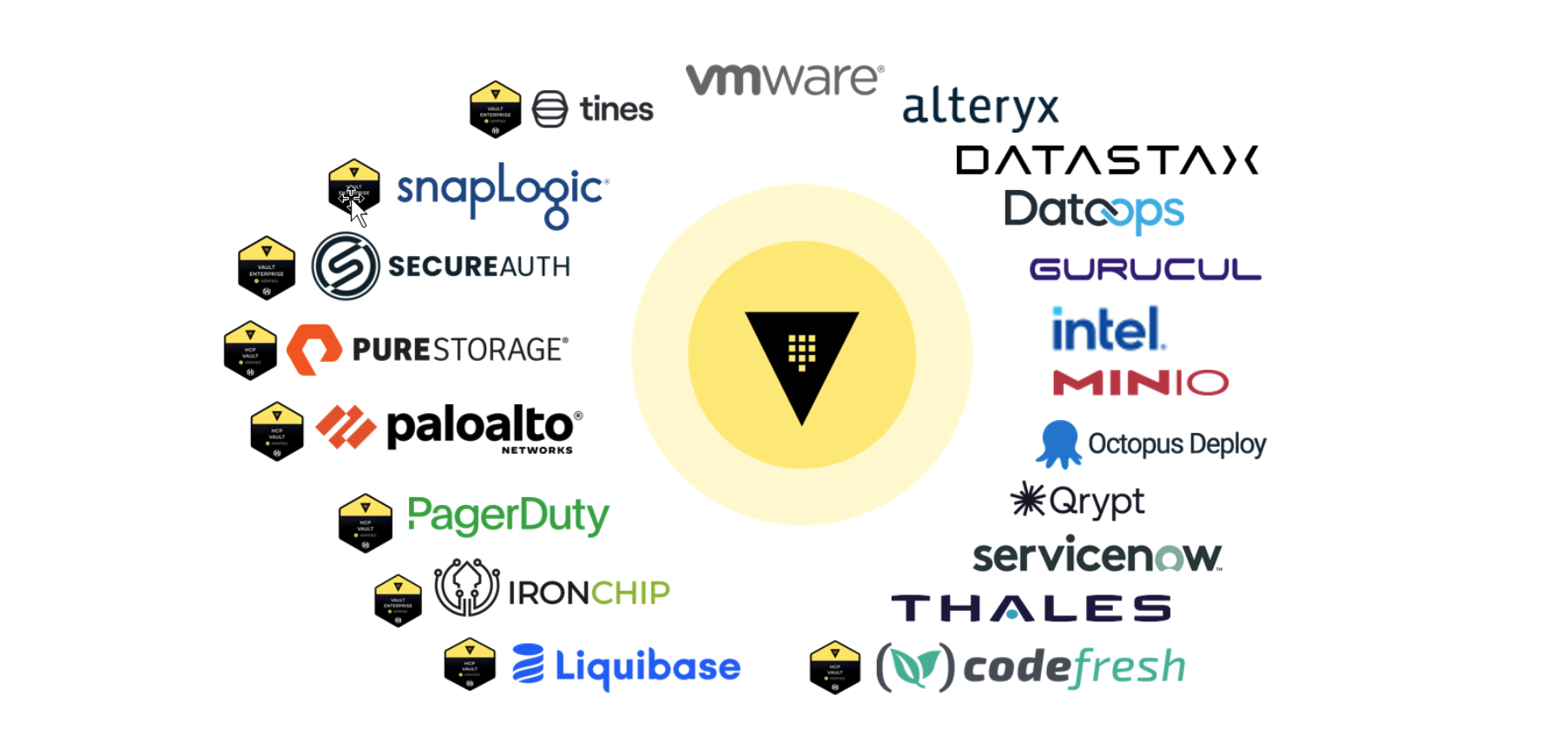The HashiCorp Vault partner ecosystem continues to show strong growth with the addition of more than two dozen new HashiCorp Cloud Platform (HCP), Enterprise, and open source Vault integrations this past fiscal quarter.

»New HCP Vault Verified Integrations
HCP Vault is a fully managed platform operated by HashiCorp, allowing organizations to get HashiCorp Vault up and running quickly to secure applications and protect sensitive data. The HCP Vault Verified badge indicates a product has been verified to work with HCP Vault. We are pleased to announce nine new integrations have now been verified to work with HCP Vault:
»Codefresh
Codefresh’s new HCP Vault integration uses secrets stored in HCP Vault in Codefresh CI/CD pipelines to provide full control over secrets storage and rotation.
»Ironchip
The HCP Vault and Ironchip integration uses IronChip as an OIDC provider to authenticate users into HCP Vault via IronChip's location-based identity platform.
»Liquibase
Liquibase’s HCP Vault integration natively reads secrets from HCP Vault in Liquibase to access databases as well as any other properties that may be considered sensitive.
»Pagerduty
The PagerDuty HCP Vault integration is a Rundeck plugin that integrates with HCP Vault for keys for jobs and other Rundeck configurations.
»Palo Alto Networks
The HCP Vault and Cortex XSOAR integration secures, stores, and tightly controls access to tokens, passwords, certificates, encryption keys for protecting secrets, and other sensitive data using HCP Vault within XSOAR pipelines.
»Pure Storage
The HCP Vault and Portworx integration allows Portworx to use HCP Vault to store encryption keys, secrets, and credentials.
»SecureAuth
The new HCP Vault and SecureAuth Authentication integration authenticates into HCP Vault using single-sign on with SecureAuth Arculix as an identity provider.
»SnapLogic
SnapLogic’s HCP Vault integration allows its Intelligent Integration Platform to integrate with HCP Vault to retrieve secrets for use within the platform.
»Tines
Customers can leverage the Tines integration with HCP Vault to retrieve an application's credentials whenever required in a workflow, instead of entering credentials into automation stories every time.
»New Vault Enterprise Integrations
Eleven new Vault Enterprise integrations were added this past quarter:
»Gurucul
The Vault enterprise integration with Gurucul retrieves credentials for accessing various data sources for ingesting data into the Gurucul Security Analytics and Operations Platform. The integration supports the use of Vault Namespaces.
»Intel
Vault is a verified External Key Management Server providing encryption keys to Intel Confidential Computing technology's Key Broker Service in this new Vault enterprise integration.
»Liquibase
The Vault and Liquibase integration natively reads secrets from Vault in Liquibase to access your database as well as any other properties you may consider sensitive. This integration supports the use of Vault Namespaces.
»Octopus Deploy
The Vault Enterprise and Octopus Deploy Secret Management Step template integration has created HashiCorp Vault step templates to retrieve secrets from Vault for use in deployments or runbooks. The templates support Vault Namespaces and offer different authentication methods options (including LDAP, AppRole, and JWT Auth) and allow users to retrieve secrets from the KV secrets engine (both v1 and v2) to be used as part of the deployment step or runbook process.
»Qrypt
The Qrypt Quantum Entropy service leverages multiple high-quality quantum phenomena sources to extract truly random numbers. The Qrypt integration with Vault connects Vault to the service to source external entropy for encryption operations.
»SnapLogic
SnapLogic’s Vault Enterprise integration allows its Intelligent Integration Platform to integrate with Vault to retrieve secrets for use in the platform.
»Thales
The Luna TCT hardware security module (HSM) integration has been validated to work with Vault's new managed keys feature, which delegates the handling, storage, and interaction with private key material to a trusted external KMS. These managed keys can be used in Vault’s PKI secrets engine to offload PKI operations to the HSM.
»Tines
The Tines integration with Vault lets customers retrieve an application's credentials whenever required in a workflow, instead of entering credentials into automation stories every time.
»New Vault Open Source Integrations
We also added eight new open source Vault integrations to our ecosystem:
»Alteryx
The Vault and Alteryx integration allows the Alteryx Analytics Platform Alteryx to use a customer-managed Vault implementation to retrieve the credentials needed to authenticate to different data sources.
»DataOps.live
The Vault and DataOps Platform integration allows the building, testing, and deployment of applications and data products on Snowflake using secrets stored in Vault.
»Datastax
The Vault and DataStax Astra DB Plugin uses application API tokens to connect applications to the Astra database using a variety of APIs. The plugin gives customers the ability to associate metadata with tokens — such as the user who created each token, and what it is being used for — and enables logging of token usage and access via Vault.
»Ironchip
The Vault and IronChip integration uses IronChip as an OIDC provider to authenticate users into Vault via IronChip's location-based identity platform.
»MinIO
The Vault and MIO KES integration allows the MinIO Server-Side Encryption (SSE) to use the MinIO Key Encryption Service (KES) to connect to Vault. Vault acts as an external root key management service providing encryption keys so the SSE can perform secured cryptographic operations at scale.
»SecureAuth
The Vault and SecureAuth Authentication integration authenticates into Vault using single sign on with SecureAuth Arculix as an identity provider.
»ServiceNow
The ServiceNow Lightstep OpenTelemetry Collector provides an integration with HashiCorp Vault to ingest metrics and provide deep insight into Vault environments.
»VMware
The Aria Operations for Applications integration with Vault enables developers and site reliability engineers to monitor the performance and availability of their Vault cluster.
»Learn More
The HashiCorp Vault Integration Program allows partners to integrate their products to work with HashiCorp Vault (both the open source and Enterprise versions) or HashiCorp Cloud Platform (HCP) Vault.
As a fully managed service, HCP Vault is the easiest way to secure, store, and tightly control access to tokens, passwords, certificates, encryption keys, and other sensitive data. For more information about HCP Vault and pricing, please visit the HCP product page or sign up through the HCP portal.
Find more information on past Vault integrations here:
- Cockroach Labs, ForgeRock, and Palo Alto Networks Highlight New Vault Integrations
- Cribl, MongoDB, and Thales Highlight New HCP and Enterprise Vault Integrations
- MongoDB Field Level Encryption with HashiCorp Vault KMIP Secrets Engine
- Red Hat, Datadog, and More Partners Add Vault Ecosystem Integrations
- HashiCorp Vault Surpasses 100 Integrations with 75 Partners
- HashiCorp Vault Integrates with ServiceNow for Credential Management
- GitHub, F5, and Okta Among New HCP Vault Integrations
- HashiCorp Releases Identity-based Security as a Service on the HashiCorp Cloud Platform









